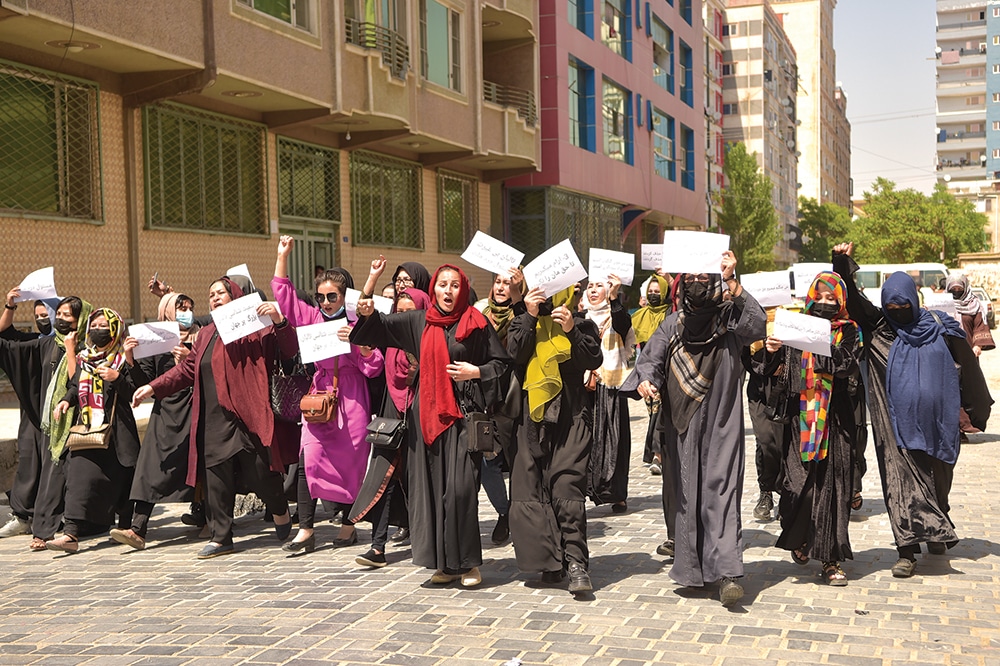KABUL: Afghan women protested in Kabul on Saturday, defying a crackdown on dissent to urge foreign nations not to formally recognize the Taleban government ahead of a UN summit next week. Since the Taleban surged back to power in 2021, protesters voicing opposition against creeping curbs on women’s rights have been beaten or detained, and security forces have fired in the air to disperse some rallies. But small groups of women have continued to stage sporadic gatherings.
On Saturday, around 25 marched through a residential area in the Afghan capital ahead of a summit in Doha that the UN says will discuss a “durable way forward” for the country. “Recognition of Taleban — violation of women’s rights,” the women chanted during the march, which lasted no longer than 10 minutes and passed off without confrontation with security forces. Other chants included “Afghan people, hostages of Taleban” and “We will fight, we will die, we will take our rights”. No nation has yet acknowledged the government as legitimate since the Taleban returned to power on the heels of a withdrawal from Afghanistan by US forces in 2021. A previous Taleban government that ruled from 1996 to 2001 was only granted formal recognition by three nations — Pakistan, the United Arab Emirates and Saudi Arabia. Diplomats, NGOs and aid agencies are currently deeply divided over the issue.
Some believe the international community might cajole the Taleban into reversing curbs on women’s rights by dangling the prospect of recognition. Others say even discussing it grants the Taleban some legitimacy at a time when they are squeezing women out of public life. Protester Shamail Tawana Nasiri, 26, told AFP that any discussion of formal recognition “will give the Taleban motivation”. “For those of us who are oppressed, and our rights taken away, it increases our concerns.” Since ousting the foreign-backed government and returning to power in August 2021, Taleban authorities have imposed what the United Nations has labelled “gender-based apartheid”.
Women have been barred from most secondary education and universities, prevented from working in most government jobs as well as NGOs and blocked from public spaces such as gyms and parks.
‘Internal social matter’
The United Nations announced on April 4 that the Taleban authorities had banned Afghan women from working in its offices countrywide, several months after an edict was issued against Afghan women working for NGOs. The move sparked wide contempt as well as a UN review of its Afghanistan operations, which is to last until May 5. The world body has stressed “the dire economic and humanitarian situation” in Afghanistan, as well as the “critical importance of a continued presence” of the UN mission in Afghanistan and other UN agencies. UN Secretary-General Antonio Guterres has organized a meeting in Doha next week with envoys from various countries to “reinvigorate the international engagement around the common objectives for a durable way forward on the situation in Afghanistan”.
Last week UN Deputy Secretary-General Amina Mohammed said the Doha meeting could see envoys discuss “baby steps” on a path to recognition, albeit with conditions. “There are some who believe this can never happen. There are others that say, well, it has to happen,” Mohammed said in a talk at Princeton University. “The Taleban clearly want recognition ... and that’s the leverage we have.” The UN has announced that the “de facto authorities” of Afghanistan have not been invited to the Doha conference. “Recognition is not an issue,” a spokesman for the world body said Friday.
The UN Security Council adopted a resolution Thursday calling on Taleban authorities to “swiftly reverse” all restrictive measures against women, condemning in particular its ban on Afghan women working for the United Nations. The resolution, unanimously adopted by all 15 Council members, said the ban announced in early April “undermines human rights and humanitarian principles.”
On Friday, however, the Afghan Foreign Ministry issued a statement saying the resolution failed to respect the country’s “sovereign choices”. “We remain committed to ensuring all rights of Afghan women while emphasizing that diversity must be respected and not politicized,” it said. “This is an internal social matter of Afghanistan that does not impact outside states.”
‘Collective punishment’
The foreign ministry statement said the government welcomed parts of the resolution — including “the principle of Afghan-led and Afghan-owned right to self-determination”. But it insisted that the humanitarian crisis was man-made and driven by economic restrictions. “The reality is that this ongoing crisis can only be resolved by the removal of restrictions on the country,” the statement said. At the UN on Thursday, Russian ambassador Vasily Nebenzia criticized the text of the resolution despite signing it. “We seriously regret and are disappointed that steps and a more ambitious approach and texts were blocked by Western colleagues,” he said. “If you’re so sincere, why not return the assets you’ve stolen from the country and without any preconditions,” he said, referring to the $7 billion in Afghan central bank assets frozen by the United States after the Taleban government seized power.
The United States announced in September the creation of a fund based in Switzerland to manage half the money. Amnesty International welcomed the Security Council resolution but said on Friday it “fell short of setting out concrete steps” that member states should take to help restore the rights of women and girls — and to hold Afghanistan’s rulers accountable. — AFP











